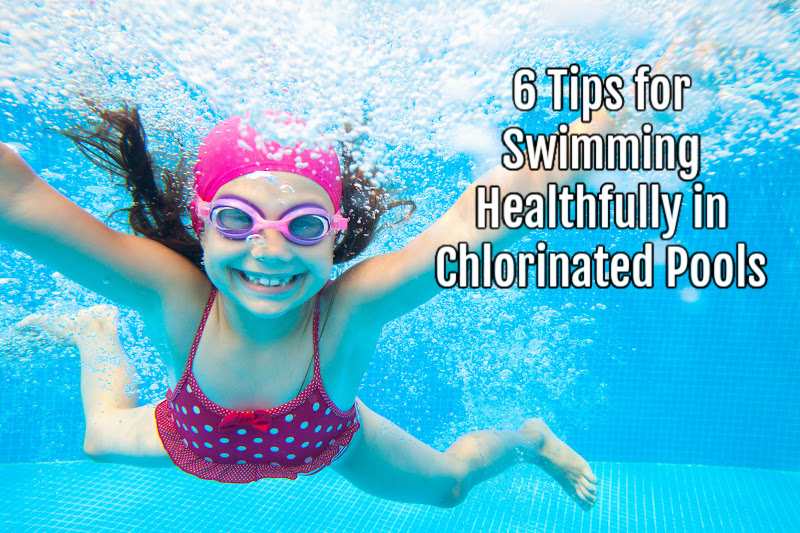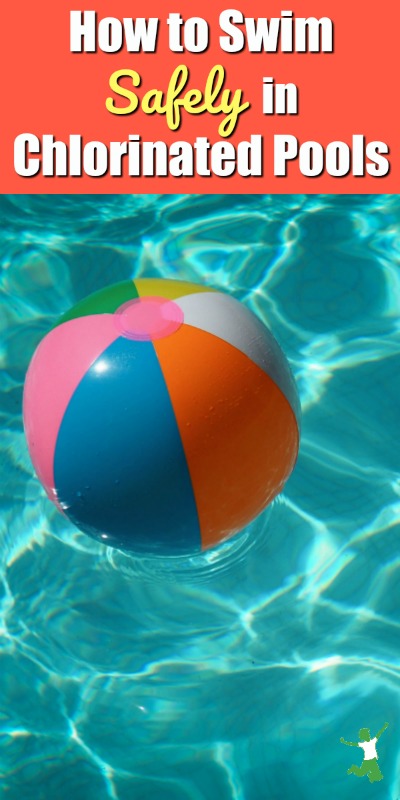The reasons why swimming in chlorinated pools is dangerous to health and the 6 steps to take to protect yourself and your family while still enjoying water fun all summer long.

The reasons why swimming in chlorinated pools is dangerous to health and the 6 steps to take to protect yourself and your family while still enjoying water fun all summer long.
An important topic to explore as we head into the summer season is chlorinated pools.
Chlorine is popular because it handles the three main jobs in keeping a swimming pool clean: It sanitizes (kills bacteria and germs), oxidizes (controls organic debris from perspiration and body oils), and deters algae. The chemical is unpopular, however, because it has a strong odor, reddens eyes, causes allergic reactions in some swimmers, and is a known carcinogen – meaning it has been linked to cancer!
Chlorine absorbs into your skin. Too much exposure to chlorine has been linked to major health problems including reproductive disorders and even birth defects. It can cause your skin and hair to dry out and over time too much exposure can even cause wrinkles.
Editor’s Note: Have you ever wondered why Olympic swimmers seem to have so many wrinkles at such young ages and most of the men start losing their hair so quickly? Could it, in fact, be caused by overexposure to chlorine for so many years and so many hours every day? Perhaps so.
When chlorinated pools are indoors, toxic gases such as nitrogen trichloride are released, which can be very dangerous. When we breathe in this gas it can cause severe damage to the lining of the lungs which could lead to respiratory problems or asthma. This toxic gas can be harmful at any age yet it poses the most risk to elderly people and small children.
So while chlorine used to disinfect swimming pools is widely recognized as a health hazard, not everyone has access to the ocean or a lake, or pools treated with ozone, ionizers, bromine, silver-cooper, or other alternatives which can frequently be much more expensive.
6 Tips to Protect Health in Swimming Pools
If you or your family members do choose to swim in chlorinated pools, some recommendations I’ve read are to:
1. Swim in outdoor chlorinated pools only if at all possible. It is much safer because the toxic gases are mostly eliminated in the open air.
2. Swim in chlorinated pools occasionally. It is regular exposure to chlorinated pools that presents the greatest risk to health.
3. Shower immediately before and after using a natural Castile soap.
4. Drink plenty of home-filtered water (better than bottled!) beforehand so that you are well hydrated.
5. Consider wearing a mask and snorkel to shield your eyes – and even a wetsuit, if you are willing to go that far!
6. Get fresh air afterward so you don’t continue to inhale the fumes, and can clear your lungs.
Why shower immediately before swimming in a chlorinated pool?
Julie Deardorff explains in her article published in the Chicago Tribute, “Another important reason to shower is that our bodies generally contain residue from consumer products, including perfume, make-up, body lotion, shampoo, and sunscreen.
When the chemicals used to disinfect the pool mix with organic matter (sweat, hair, urine) or nitrogen-rich substances (commonly found in consumer products) it can create a more toxic agent, said Michael Plewa, a professor of genetics at the University of Illinois whose new research has linked pool chemicals to health problems, including asthma and bladder cancer.”
Red, burning, itchy eyes and skin?
What I’ve read is that the presence of chloramines can cause reactions such as red, burning, irritated eyes: Chloramines form when chlorine reacts with ammonia. Ammonia enters the pool through sweat and urine. It is important to teach children not to urinate in pool water [even though it is chlorinated].
Also, showering before swimming can remove excess sweat that interacts with chlorine. My understanding is that if the sweat is on your skin, and hasn’t been rinsed off first in the shower, the chlorine will interact with the sweat on your skin as you enter the pool, and may result in some folks getting itchy skin.
So, what do you think? Do the benefits and joy of swimming and playing in a pool outweigh the health risks of chlorine?

Additional articles on this topic
The Dangers of Chlorine
Asthma In Swimmers
Swimming Pools May Increase Cancer Risk
The Hidden Danger of Swimming Pools
Swimming Pool Alternatives to Chlorine
Water Birth Dangers








I even heard of spraying yourself down with an epsom salt and water spray after swimming. Not sure if that works.
We avoid chlorinated pools pretty much completely. My son and I are both very sensitive to it and end up feeling sick, itchy, and miserable after being in chlorine. This just further confirms we will swim in fresh water or salt pools when we can.
This is so true. My oldest son (12yo) hates to go to swimming pools, because he feels sick afterwards. The suggestions given in this article are things we have tried before, and they do help. Also I think the before-swim shower helps to saturate the body with water, so less chlorine is absorbed. We have a chlorine filter on our shower at home, which is good for rinsing off afterwards.
It’s difficult for me to read this, because my daughter likes babyswimming very much (she’s 11 months old). But ofcourse, the swimmingpool is indoor and chlorinated. No options to go outdoors or go to a non-chlorine pool. I can’t teach her not to pee in the water, she’s too young. I put coconutoil on her body before swimming, and we take a shower before and after. Sometimes she swallows water, hard to avoid. Swimming is so relaxing for us both, but after reading this I’m not sure about it anymore. I live in a water country, and think it’s important for her to get familiar with water at a young age. Do you have more advice for me? Thank you very much.
I’ve been swimming in public pools since i was in my mama’s belly (she raced until 6 months pregnant with me). I’ve seen public pools with green water and i wouldn’t dare jump in those (flesh eating bacteria are way scarier). I’m not gonna downplay the potential danger of putting babies in chlorine, but i think I turned out fine. Just do the best you can, and don’t avoid having fun with your kids. My favorite childhood memories were around the pool with my parents.
This us quite concerning, even more so given our drinking water ( therefore bath water also) is full of chlorine too :/
scary article. I wanted to point out that the author appears to be unfamiliar with the functioning of a wet-suit, likely confusing it with a dry-suit.
Hey i want to know why we rinse our feet in blue colour soln (i think it iodine soln).? is there any benifit.
This scare mongering is coming from the most obese country in the world? The health and fitness benefits of a proper swimming session far outweigh the use of chlorine. Swimming is one of the best cardiovascular and aerobic activities. Millions of people have gone swimming over decades without a problem. You can now find pools that are sanitized by using ultraviolet light in the plumbing and don’t rely on chemicals.
Because it’s the most obese country in the world is why we need to be aware, it would be nice if we didn’t have to worry. Ain’t nobody advocating for ppl to stop swimming, just do it in a safer manner.
Very informative findings in your article, also might be worth mentioning that chlorine in pool waters was indicated also with positive results for sufferrers of eczema or hidradenitis suppurativa or acne inversa, which noticed an improvement in their skin condition after using the pools regularly.
I appreciate this post and all the comments. I feel like an indoor pool is my best choice right now – I’m in Seattle and our summers are short and not very hot. I’d like to take my 4yo to a pool every other week for a couple months to acclimate him to more water than a bathtub. He’s a cautious, sometimes fearful kid and the short outdoor season isnt long enough. I’m glad for the ideas about vit c.